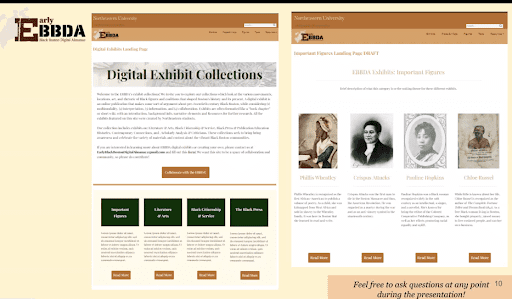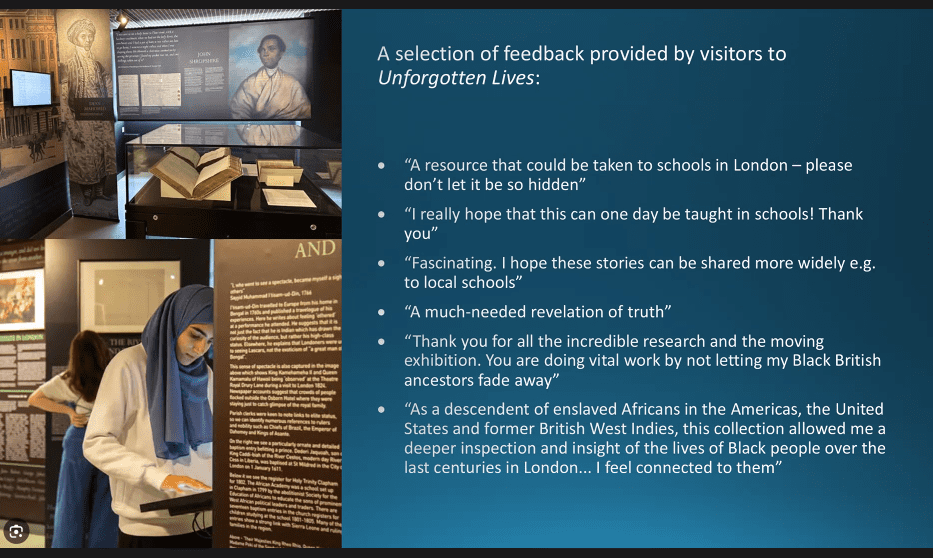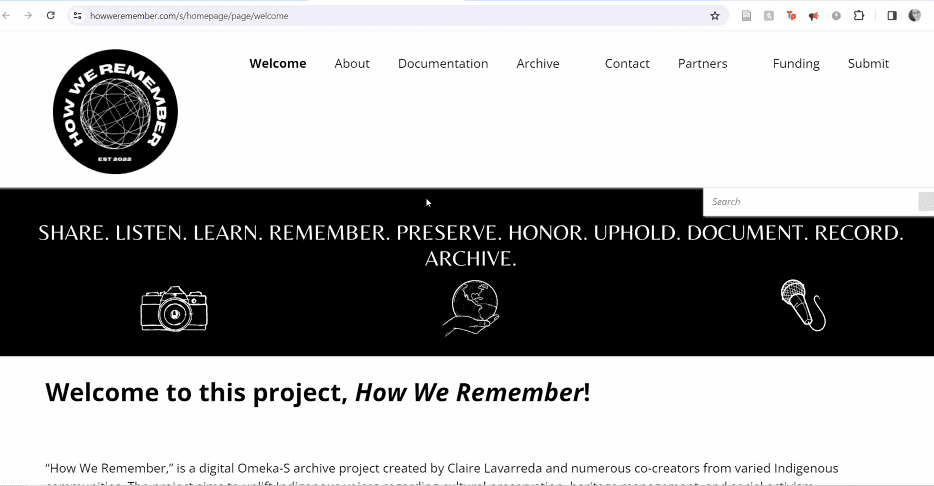As a part of the Digital Humanities Spring 2024 Open Office Hours series, the Digital Scholarship Group and NULab for Texts, Maps, and Networks at Northeastern University brought together researchers for an important panel on community-engaged research. The panel featured talks by Yana Mommadova (Sociology), Tieanna Graphenreed (English), Juniper Johnson (English), Savita Maharaj (English), Olly Ayers (History, Northeastern University London), and Claire Lavarreda (History).
Doctoral students Tieanna Graphenreed, Yana Mommadova, Juniper Johnson,and Savita Maharajspoke about their collaboration with Boston Public Schools (BPS) educators on the Early Black Boston Digital Almanac: K-12 Professional Development Workshops project. The Early Black Boston Digital Almanac arose out of student research conducted in 2014 in Professor Nicole N. Aljoe’s History classes on literary representations of Boston and early African-American literature in the US. The research aims to address how digital technologies can tell more inclusive stories of Boston’s early history, how research can challenge the dominant narratives of Black communities in Boston, and how the project can empower inclusive, digital learning in BPS.

Recently, the project has co-produced and is testing a K-12 curriculum and complementary digital resources with BPS leaders, teachers, and students. In addition, the research team is putting together professional development programs for BPS teachers to be able to introduce the Early Black Boston Digital Almanac curriculum to students, and working to align the curriculum materials to state standards. Yana and Juniper spoke to the project’s growing pains as it approached its 10-year anniversary, explaining how the Early Black Boston Digital Almanac project experienced issues maintaining a reliable digital presence. With the support of the NULab grant, the project was successfully able to migrate their digital resources to a new, stable and sustainable website. The new site features a re-designed look, additional digital exhibits, maps, and texts, and ensures the Early Black Boston Digital Almanac is accessible.
Professor Olly Ayers spoke about his experiences working with creative industry partners in London on the Mapping Black London: Engaging Communities in Multiracial History to Build Equitable Futures, which was co-founded with Professor Nicole Aljoe. The project began in 2020, as one of the first collaborations between the Northeastern Boston and London campuses. One of the research project’s early goals was to map the life and relationships of Black British composer, writer, and abolitionist, Charles Ignatius Sancho, in 18th-century London. Through mapping Sancho’s social connections, the research uncovered a forgotten story of London’s past.
Current narratives of London’s multicultural history tell a false story of post-WWII multiculturalism, and this research seeks to challenge thisnarrative. By mapping the social connections and places of 18th-century London inhabited by immigrants, the research shows how Londoners of African, Caribbean, Indigenous, and Asian descent have had an active presence in the city’s history much earlier than modern narratives say.

The second phase of the Mapping Black London project focuses on engaging modern London residents to make sure narratives of London’s multicultural history are remembered. The project collaborated with the London Metropolitan Archives to create the Unforgotten Lives Exhibit, showcasing the network of places and relationships shared by Black, Caribbean, Indigenous, and Asian Londoners in the 18th century. The Unforgotten Lives exhibit currently resides in the London Metropolitan Archives and was turned into an outdoor, summer pop-up that traveled around the city. Residents who attended the exhibit were excited to learn about London’s early multicultural history, and wanted to see the project bringing this research into schools. Olly aims to work with schools to create workshops where students can experience digital mapping themselves and add to the growing history of early Black London. In addition, Olly is interested in creating a virtual tour of the Unforgotten Lives exhibit to extend the life of the work beyond the exhibit.
Claire Lavarreda spoke about her project, How We Remember: Indigenous Perspectives on Archiving, Museums, and Community History. The project began in 2022 and is a digital archive comprising of oral histories and interviews with Indigenous community members. This scholarship builds upon work from Shawn Wilson’s Research Is Ceremony, which explores Indigenous research paradigms and methods to establish respectful and accountable research relationships. The How We Remember project works with participants to consider what the preservation of memory looks like for Indigenous individuals, cultures, and communities around the world.

To build the How We Remember digital archive, Claire used digital tools to record and edit her conversations with interviewees, such as Zoom, YouTube, Clideo, and Audacity, and then processed the audio into digital transcripts of the recorded oral histories. The project centers the care of interviewees, as well as the transparency of the research process and funding. Claire has made the digital archive open to interviewees so they can remove their information if they want, and she is taking steps to honor participants’ wishes in how their information is used. The project has interviewed a suite of Indigenous community members and you can find these on the How We Remember project website.
While Claire’s work is ongoing, she recounted some of the initial challenges of the project, such as language barriers and digital infrastructure issues in interviewees’ host locations, as well as the solutions she found to overcome these issues, such as digital and human translators, and self-recording options. As the How We Remember archive grows, Claire is recruiting more participants and working on getting approval for interviews-based research from the Northeastern University Institutional Review Board.
These research projects have been supported by NULab Community Collaboration Grants. For those interested in attending future DH events at Northeastern University, please follow this link to the NULab events page.



